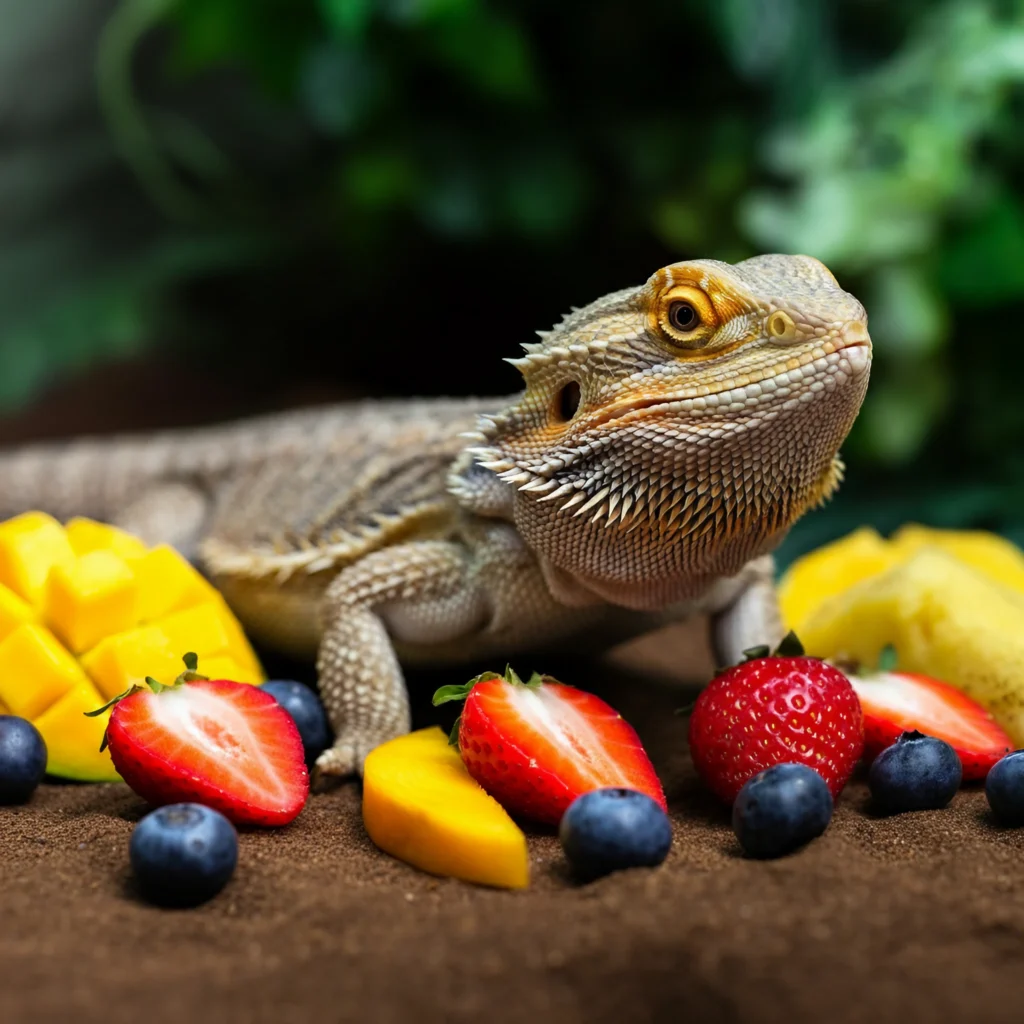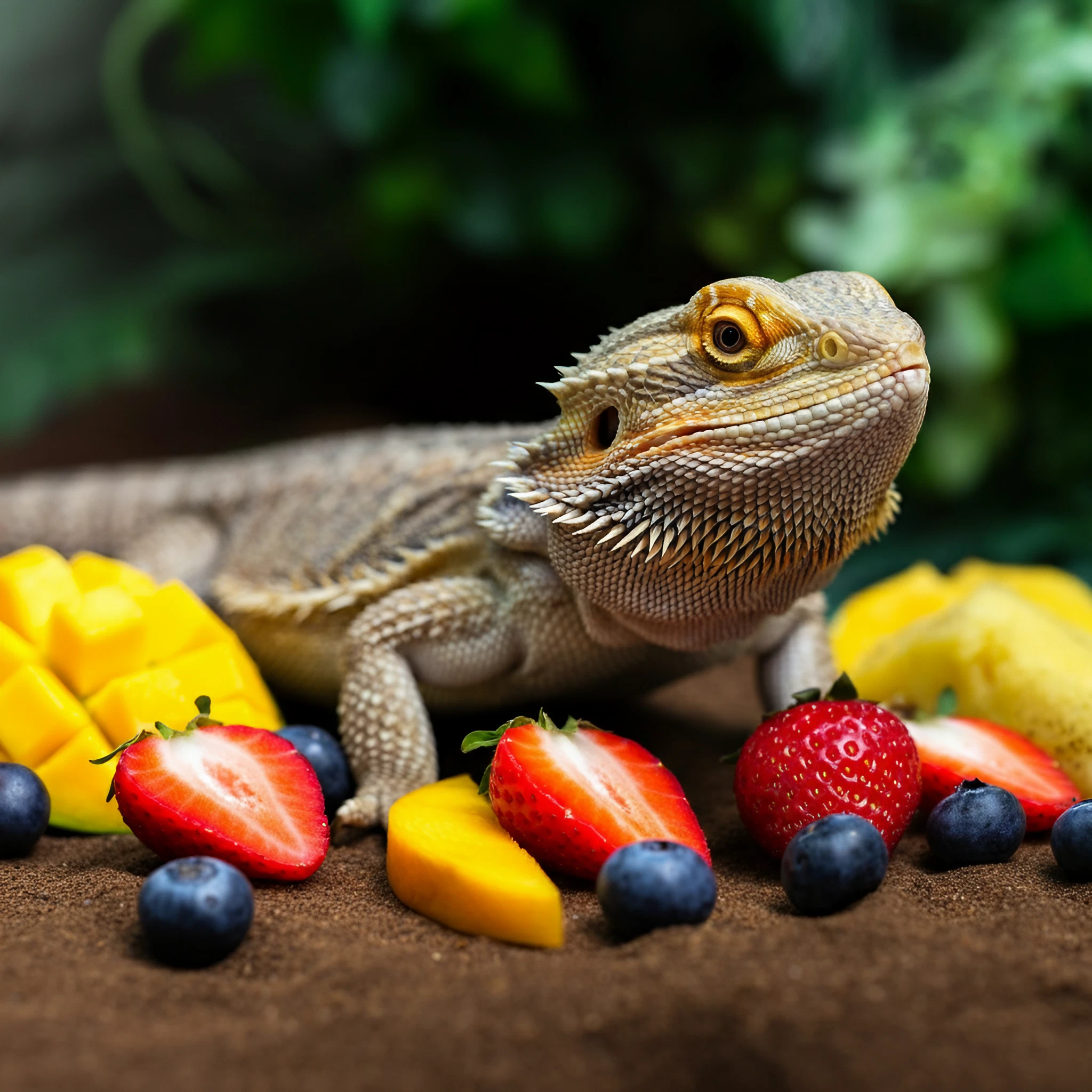What Fruits Can Bearded Dragons Eat Safely? Top Choices

Bearded dragons are fascinating and lovable reptiles, making them increasingly popular as household pets. However, owning one comes with the responsibility of ensuring their dietary needs are met for them to thrive. If you’ve been wondering, “What fruits can bearded dragons eat safely?” or “What fruit can bearded dragons eat?” you’re in the right place. This guide provides a comprehensive overview to help bearded dragon owners choose the best fruits, avoid harmful ones, and create a balanced diet for their scaly companion.
Bearded Dragons as Pets
Bearded dragons, affectionately known as “beardies,” are native to the arid regions of Australia. These social reptiles are highly sought after due to their friendly demeanor and relatively easy care requirements. However, one key factor that contributes to their overall health and happiness is their diet.
Beardies are omnivores, which means they eat both plants and insects. Their diet typically consists of leafy greens, vegetables, fruits, and protein sources like live bugs. While fruits are not the primary component of their meals, they do make an excellent occasional treat. But how do you know which fruits are safe? And how much is too much? Let’s break it down.
Understanding Bearded Dragon Nutrition
A balanced Bearded Dragon Diet is crucial to maintaining their energy levels, strong bones, and vibrant colors. A healthy diet includes:
- Leafy Greens and Vegetables (Majority of Diet): These form the staple of a bearded dragon’s diet. Options like collard greens, mustard greens, squash, and bell peppers are excellent choices.
- Protein from Live Bugs (Smaller Portion): Younger dragons require more protein from insects like crickets and dubia roaches, but the balance shifts to more greens as they age.
- Fruits (Occasional Treats): Fruits contribute essential nutrients and hydration, but they should not exceed 10%-15% of your dragon’s overall diet due to higher sugar content.
Now, let’s focus on fruits that are safe and how they fit into a nutritious plan.
Safe Fruits for Bearded Dragons
It’s important to know which fruits are safe for bearded dragons—it’s not just about taste, but also about their nutritional value. Here are some top choices:
1. Strawberries
Can bearded dragons have strawberries? Yes! Strawberries are an excellent occasional treat for your beardie. They are low in oxalates (compounds that can interfere with calcium absorption) and provide vitamins and hydration.
2. Blueberries
Blueberries are another favorite among dragons. They are rich in antioxidants and have low sugar content compared to other fruits, making them a safe choice in moderation.
3. Papaya
Papaya is highly nutritious and calcium-rich, which is vital for preventing metabolic bone disease in bearded dragons. It’s also rich in vitamin A, which supports good vision.
4. Mango
Mango slices can provide vitamins A and C. Just be sure to peel them and remove the pit, as the skin may be too tough for your dragon to digest.
5. Melons
Both cantaloupe and watermelon can make hydrating treats for your dragon, especially on warm days. Remove all seeds and offer in small, bite-sized pieces.
6. Figs
Figs are calcium-rich and sweet but contain higher sugar levels. A tiny piece every so often is fine for your beardie’s diet.
7. Apples (Peeled)
Apples are safe for bearded dragons as long as they are peeled, cored, and served in small pieces. Avoid apple seeds due to their toxicity.
8. Pineapple (Occasionally)
Remove the tough skin and core before serving pineapple to your bearded dragon. It’s a good source of vitamin C but has higher acidity, so only provide it occasionally.
By occasionally including these safe fruits, you can add variety and essential nutrients to your bearded dragon’s diet while keeping them happy.
Forbidden Fruits for Bearded Dragons
Just as some fruits are safe, others can be harmful or even toxic to your bearded dragon. Here are fruits you should avoid:
1. Citrus Fruits (Oranges, Lemons, Grapefruits)
Citrus fruits contain high acidity, which can upset your dragon’s digestive system and lead to health issues.
2. Avocado
Avocado is potentially toxic to bearded dragons due to a compound called persin, which can cause severe health complications.
3. Rhubarb
Rhubarb contains high levels of oxalates, making it extremely dangerous to bearded dragons. Even a small amount can cause serious harm.
4. Grapes and Raisins
While not outright toxic, grapes and raisins are not recommended due to their high sugar content and potential choking hazard.
Avoid feeding these fruits altogether to ensure the safety and well-being of your bearded dragon.
Best Practices for Feeding Fruits
To ensure your bearded dragon experiences the benefits of fruits without any risks, follow these best practices:
1. Portion Sizes
Limit fruits to about 10%-15% of your bearded dragon’s total diet. Overfeeding fruits can lead to obesity and other health issues.
2. Frequency
Fruits should be treated as occasional snacks, not daily staples. Offering fruits 1-2 times a week is generally a safe approach.
3. Preparation
- Always wash fruits thoroughly to remove pesticides.
- Cut fruits into small, manageable pieces to prevent choking.
- Remove seeds, pits, and tough skins before serving.
4. Monitor Responses
Pay attention to how your dragon reacts to new fruits. If you notice lethargy, diarrhea, or other unusual behavior, stop feeding that fruit and consult your vet.
5. Combine with Greens
To maintain a balanced diet, mix fruit pieces with leafy greens. This ensures your bearded dragon gets the necessary nutrients while enjoying a flavorful variety.
Frequently Asked Questions
Can Bearded Dragons Eat Broccoli?
Broccoli is safe in small amounts but should not be a staple due to its oxalate and goitrogen content, which can interfere with calcium absorption.
Can Bearded Dragons Eat Cucumbers?
Yes, cucumbers are safe for bearded dragons and can provide hydration. However, they should only be an occasional addition due to low nutritional value.
Can Bearded Dragons Have Strawberries?
Absolutely! Strawberries are safe and a great treat in moderation, as they are low in oxalates and high in vitamin C.
What Happens If My Dragon Eats Forbidden Fruits?
Accidental ingestion of harmful fruits should prompt close monitoring for adverse reactions. Contact a vet immediately if you notice symptoms such as vomiting or lethargy.
Keeping Your Bearded Dragon Happy and Healthy
When it comes to feeding your bearded dragon, variety is key, but balance is essential. Safe fruits like strawberries, blueberries, and figs can provide your dragon with valuable nutrients and hydration, while forbidden fruits like citrus and avocado must be avoided.
Using these tips and practices, you can keep your bearded dragon thriving. Always remember, when in doubt about your dragon’s diet, consult a reptile vet for expert guidance. Happy feeding!

